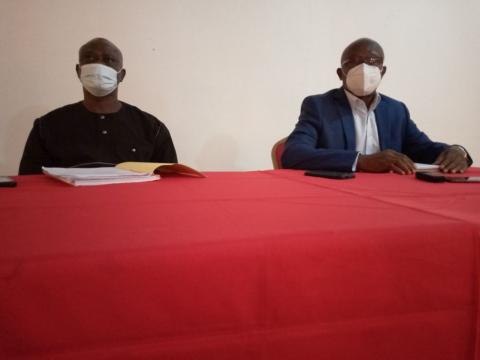By Mabinty M. Kamara
A coalition of more than 20 civil society organisations met this week to discuss the amended Mines and Minerals Act due to be tabled in parliament soon.
They critically reviewed the document and presented their observations to the ministry.
The National Advocacy Coalition on Extractives (NACE) say they want to ensure the Mines and Minerals Bill and the National Mineral Agency Bill are consistent with the Africa Mining Visions and people-centred.
The Chairman of the session, Herbart McCloud said what they were gathered for was important to the growth and development of the country, noting that Sierra Leone was considered to be a mineral-dependent country though he said that was now contestable.
“We have large reserves of a couple of minerals in the country; and in our history these have contributed greatly to our export earnings” he said.
He went on that they had not contributed significantly to growth or employment. However, he went on, “because of the signs of the revenues we get from them, the economy can actually be considered dependent; as we saw in 2013, 2014 when we had a double digit growth rate. That was primarily due to what was coming from the mining sector,” he said.
In his statement the Country Officer at the Open Society Initiative for West Africa (OSIWA), Joe Pemagbi said they continued to work with Civil Society Organisations for effective management of the country’s natural resources and for a comprehensive legal framework that could take the people onboard.
He urged NACE to engage in consultative and constructive advocacy and dialogue to get the confidence of the government.
“This is an opportunity that has been presented to all of us representing the people of this country to share our views, our thoughts on these two documents that we know the government through the National Minerals Agency, the supervisory body; the Ministry of Mines and Minerals Resources are looking at very closely,” he said.
He added: “For us at the Open Society Initiative for West Africa (OSIWA) we see ourselves as partners in this whole business. That is why we have been supporting the Civil Society Coalition on Extractives to amplify their voices and also citizens that they interact with for effective governance and effective management of our resources. But it’s not just about the diamond, the gold and the bauxite but also the lands.”
In his presentation, Dr. Mustapha Thomas, Head of Department at the Geology Department at Fourah Bay College said NACE continued to engage with the government, communities, and mining companies and their involvement in the Sierra Leone Extractive Transparency Initiative (SLEITI) multi-stakeholder group.
He added that the two documents were the vehicle to their destination so they should ensure that it fired on all cylinders to ensure their safe arrival.
He commended the Minister of Mines and Mineral Resources for the opportunity given for CSOs to review the documents before it is tabled before parliament “for the first time”.
Dr Thomas said NACE and its partners had been part of the journey since its launch because the consultations started a long time ago. He said they had been part of the process throughout.
“But we are now in the position where new concerns have been raised, and I think it's fitting that we look at the emerging issues and let us see how we can factor them into it” he said.
He went on that the new nine-member board proposed in the bill, which is an integration of the NMA and the Minerals Advisory Boards, made no provision for civil society representation and lacked gender consideration. He therefore recommended for the inclusion of women.
Another issue he pointed out in the draft bill was that, as part of its mandate, the agency should ensure the administration and enforcement of the Mines and Minerals Development Act, an issue which he said contradicted the parent Act in which the administration of the Act is in the hands of the Minister and implementation in the hands of the Director General.
Copyright © 2021 Politico Online








